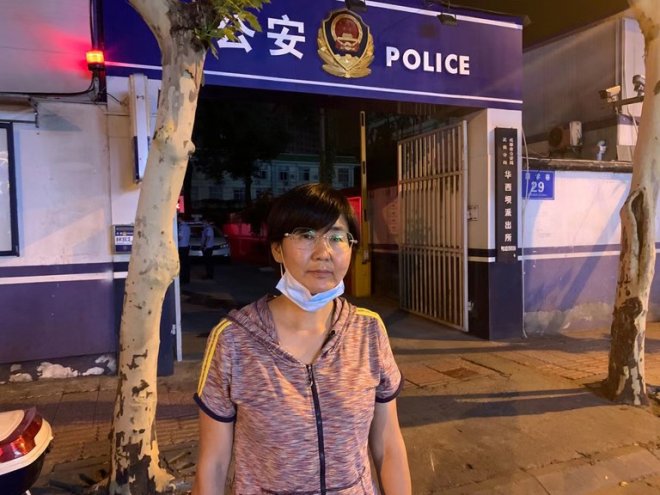
Border guards have stopped an outspoken former Tsinghua University professor from entering Hong Kong, as authorities in China step up the use of exit bans to prevent dissidents from fleeing overseas, according to a Spain-based human rights group.
Retired Tsinghua sociology professor Guo Yuhua was among a group of high-profile intellectuals who signed an open letter in October 2020 calling for the release of detained publisher Geng Xiaonan, who was herself jailed for three years in February 2021 for "illegal business operations" after she publicly supported Tsinghua colleague and dissident Xu Zhangrun.
Guo and her husband arrived in the southern Chinese city of Shenzhen, which borders Hong Kong, last month, and were stopped as they tried to cross the internal immigration border into the former British colony of Hong Kong, despite holding a valid travel permit.
"They stopped her and said she wasn"t allowed to leave," Beijing-based independent journalist Gao Yu told Radio Free Asia. "When she asked why, they showed her a document issued by the Beijing municipal police department placing an exit ban on her."
"She believes that … [this] is unreasonable and illegal," Gao said, adding that the exit ban is a form of "political persecution" wielded by the ruling Chinese Communist Party.
Repeated calls to Guo"s mobile number went unconnected during office hours on Monday.
Exposing injustice
Gao said Guo"s public support for Xu Zhangrun could have been the reason for the ban.
"She has always espoused universal values [like freedom and democracy] and has exposed a lot of injustice in China," Gao said. "She was the only person at Tsinghua to speak up in support of Xu Zhangrun, and was hauled in by [university authorities] for it."
Beijing-based rights lawyer Wang Yu said she is in a similar situation.
"Anyone they see as being harmful to the system will be persecuted in various ways, despite the fact that all we ever wanted was to help this country develop in a good direction," Wang said.
Guo"s travel ban comes days after China amended its Counter-Espionage Law to enable the use of exit bans on both Chinese and foreign nationals being investigated on "national security" charges, or on Chinese nationals deemed a "potential threat to national security" if they are allowed to go overseas.
 "Anyone they see as being harmful to the system will be persecuted in various ways, despite the fact that all we ever wanted was to help this country develop in a good direction," says Beijing-based rights lawyer Wang Yu. Credit: Provided by Wang Yu
"Anyone they see as being harmful to the system will be persecuted in various ways, despite the fact that all we ever wanted was to help this country develop in a good direction," says Beijing-based rights lawyer Wang Yu. Credit: Provided by Wang Yu
While bans on nonessential travel featured heavily during the stringent lockdowns, mass quarantines and compulsory testing of the zero-COVID policy, which ended in December 2022 following nationwide protests, restrictions remain in place for many critics of the ruling Communist Party.
Border guards in the southern province of Guangdong, home to some of the highest-volume border crossings in China, have prevented a number of rights activists from leaving in recent weeks.
Chinese rights lawyers Tang Jitian and activist Guo Feixiong were both prevented from leaving China to take care of dying next-of-kin.
Changing the laws
According to a recent report by the Spain-based rights group Safeguard Defenders, last week"s legal amendments were the latest in a slew of changes to 15 laws, allowing the widespread use of exit bans, the report said.
"In the absence of transparent official data and excluding ethnicity-based exit bans, which number in the millions, we estimate that at least tens of thousands of people in China are placed on exit bans at any one time," the report found.
"Many of these exit bans are illegitimate and violate the Universal Declaration of Human Rights principle of Freedom of Movement."
Rights activists, family members of Chinese dissidents overseas, Tibetans, Uyghurs and other ethnic groups and foreign journalists have all been targeted by the measures in recent years.
"Safeguard Defenders calls on China to urgently [and] immediately annul all exit bans issued on the basis of ethnic group, [human rights] activities, family ties and for any other reason that is neither necessary nor proportionate," the group said in a statement launching the report.
Former government censor Liu Lipeng said there is a growing atmosphere of xenophobia under supreme leader Xi Jinping, and that Beijing"s overseas influence and disinformation campaigns have led some to become trapped back in China despite being permanent residents of the United States.
"There were rumors in Chinese circles in the United States that there was no risk in going back to China for certain people who had applied for political asylum," Liu told Radio Free Asia in a recent interview.
But when some people went back for a visit based on this assumption, they had their passports confiscated by the authorities, he said.
"They can"t leave [China] now, despite having a green card," Liu said. "This is very, very worrying to hear."
Risky visits
Liu said the anti-spying law is so vaguely worded that even visiting a website outside of the Great Firewall of government blocks and censorship could fall under "threats to national security," and attract an exit ban.
He recommended the use of a separate phone for visiting overseas websites using a virtual private network tool, which are banned in China.
"If you are interviewed, they will probably tell you to hand over your electronic devices, and you just give them the phone without VPN, which will be much safer," Liu said.
According to Safeguard Defenders, China targets a wide range of people with exit bans, including criminal suspects, military personnel, ethnic-religious groups, foreign journalists, party and state officials under investigation for graft, their family members, and anyone caught up in a civil dispute.
Tibetans and Uyghurs have been subject to exit bans and tight controls on passport applications since 2002, according to the New York-based Human Rights Watch.
A document leaked in 2019 revealed that “applying for a passport” was listed as a potential reason to send a person to one of Xinjiang"s mass incarceration camps.
"Such ethnic or region-based exit bans are clearly racist and have no legal basis under China’s domestic law," Safeguard Defenders said.
Translated by Luisetta Mudie. Edited by Malcolm Foster.